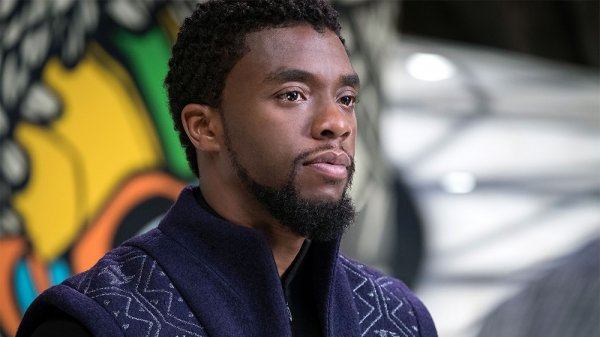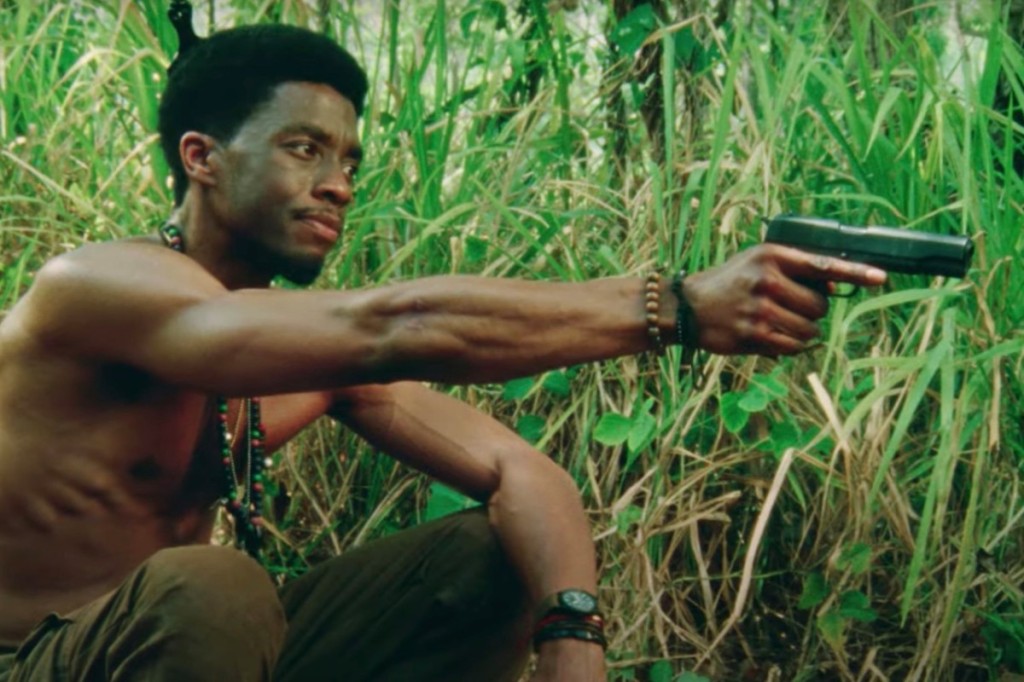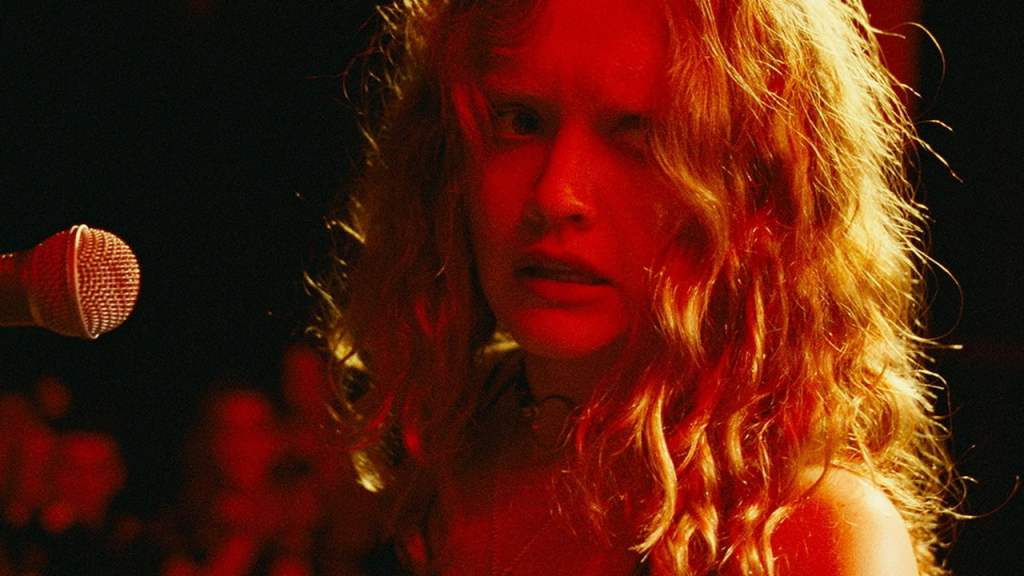
Chadwick Boseman in “Black Panther.” credit: movieinsider.com
It’s Oscar time again, and here’s my annual project of catching up with mainstream Hollywood, taking a break from my usual older foreign films and giallos. There are many throwback projects represented here this year: biographies, period pieces, only a few outrightly fictional – my favorites, of course, made a point to move things along rather than work familiar territory.
A Star Is Born – for his feature-film directing debut, Bradley Cooper chose a tried-and-true boilerplate show-biz melodrama. He wisely didn’t try to make the next Citizen Kane or Maltese Falcon; he chose a genre and a style that would tend to itself while he worked on the foundations and detailing, and fashioned an acceptable piece of middlebrow mainstream Hollywood schmaltz entertainment. That the film is regarded as several leagues above this modest but admirable accomplishment is baffling to me, but Warner Bros is, of course, promoting the hell out of it. Lady Gaga is always very good at being Lady Gaga, but the actressin’ otherwise is a little thin. She needed a better director. I saw Bohemian Rhapsody soon after this, and was relieved to find involving narrative dynamics combined with a genuinely thought-out visual plan, two things conspicuous in their absence here. I wish cinematographer Matthew Libatique all the best, but he could have shot this in his sleep. And, as co-writer of the adapted script, Cooper didn’t get much help from Eric Roth or Will Fetters in creating a remotely interesting character. The script says he’s famous, so there’s that, and there’s some nice-guy lip-service early on, but there isn’t much else to care about here. It’s doing good business, and lots of people like it, but I don’t see much of a shelf life here past the next few weeks, even if it wins.
Black Panther – It’s ironic that this was the year the Academy tried to establish a “Best Popular Film” category, and gave the idea up. This film hits all the buttons – well-written, well-structured, well-shot, well-performed, thrilling, smart and fun, critically praised and a box-office hit. It does everything it aspired to do, and a fair amount more. It’s tough to make comparisons to Roma or The Favourite – they’re completely different stories for completely different intended audiences. Nonetheless, it’s one of my two favorites this year (with BlacKkKlansman) for those very reasons. The usual CGI onslaught threatens to bury the last 15 minutes – that just comes with Marvel/DC superhero territory – but Coogler and his writers orchestrate the action and the narrative mythology well; it’s as exciting and engaging a film as I saw all year. I think we all know why this was a watershed release for an enormous swath of the moviegoing public considering what’s come before, but, honestly, I hope we can just acknowledge that, without qualification, on its own, it’s just a big fun great movie.
BlacKkKlansman – Spike Lee, a true reliable veteran, has always been able to flush out and illuminate particular characters, particular environments, the intersections of various cultures, and work a big range between instructive gravity and flat-out entertainment. I suspect he found Ron Stallworth’s book almost irresistible – Colorado Springs’ first black cop (played by a terrific John David Washington), working in the intelligence office, sees a recruitment ad for the KKK in the local paper and calls it. Is it really that easy?! Well, not so much later, as Ron and his fellow undercover cop Flip (Adam Driver) (Ron’s white alter-ego) discover. But what a story. Spike keeps a great George-Romero-like balance between showing us why “the organization” is ridiculous while taking them absolutely seriously nonetheless. And there’s fun and joyfulness peppered in as well, including a great dance sequence, all cohesively orchestrated. But Spike’s not shy about speaking truth to power, either. He illustrates the toll that racism takes on all of us, not just the perpetrators or victims. I don’t suspect it will crack the favorites, but it’d sure be great if it did. And Spike’s a serious contender for Best Director. It’s superb.
Bohemian Rhapsody – one of the critics for the Chicago Reader lamented a while ago that most of these musician / performer bioflix lazily draw from sports movie templates – disappointment, success, escalate, disappointment, success, rinse and repeat. The story of the formation of the wonderful rock ‘n’ roll band Queen is, as previously mentioned, very professionally presented – well-conceived by director Bryan Singer, and well-shot by Newton Thomas Sigel (Singer’s preferred cinematographer). Peter Morgan and Andrew McCarton are genuinely talented screenwriters who took care to keep Brian May and Roger Taylor happy, but, aside from the particulars of Freddie Mercury’s story, we’ve seen this all before. It’s well-executed formula, but it’s, y’know… In many ways, the aforementioned got lucky with Rami Malek, who, it must be admitted, owns the best sequences of the film. The writers have some trouble balancing Freddie’s personal dynamics – the musicianship seems irreproachable, but some critics aren’t happy with how much credibility Paul Prenter (Freddie’s personal manager) is given (a convincing Allen Leach); others will still resent Mercury for not being forthright about his eventual HIV status. And, outside of the film itself, there are solidly disturbing reports of director Bryan Singer’s own abusive sexual behavior over a long period of time. It’s a very good movie for what it is, and it has a few tear-inducing shots of right-minded nostalgia, but it just doesn’t successfully do justice to Freddie or that great band. You’ll have to make up your own mind about director Singer and if he’s debased his own previous work. Nonetheless, I will continue to assert, at least, that his film blows A Star Is Born out of the water.
The Favourite – I’m delighted to immerse myself in the high-rent-district aspirations of this quite wonderful film. Like good Shakespeare treatments, we accept the larger-than-life historical context of royalty and command while also appreciating the humanization of those characters – one doesn’t diminish the other. The screenplay by Tony McNamara and Deborah Davis is densely packed, involving and naturalistic, but extraordinary amounts of dark fun are had at the players’ expense in the course of relating what eventually becomes a profoundly sad story. Director Yorgos Lanthimos has been in this class for a while now, but the a-list talent he acquired for this project really brings it home – all of those acting nominations are richly deserved, Robbie Ryan’s cinematography is a master-class of composition, color, lighting and what can be done with lenses, and veteran costumer Sandy Powell delivers impeccable work, again. I love the film for all the reasons I love Black Panther; I just don’t believe it’s going to get comparable love from the Academy voters. I’d love to be proven wrong…
Green Book – A number of the films here are throwbacks of a sort to the sixties and seventies. This is a film that I wish had been made in the sixties or seventies by, say, Norman Jewison or Stanley Kramer, where its context and novelty might have been less problematic, and softened overall by its anachronism. But spending the film’s length watching a white man teaching a black man about black popular culture, regardless of how endearingly or historically accurate that black man is portrayed, is a real test of our suspension of disbelief. The film’s terrific actors, Viggo Mortensen and Mahershala Ali, have flushed out the material as graciously and creatively as possible, eschewing the overt sentimental trade-offs with which the script is booby-trapped. But there’s a clearly unearned nostalgia for racism here – “hey, remember back when this stuff was a big deal?” Yes, we do, and not enough of that has changed, and many things that got better are losing ground, and I’m not sure this film is helpful. Narratives, in film, books, theater, TV or whatever, don’t come hermetically sealed – they are absorbed into the larger world in which they are told. Peter Farrelly and Nick Vallelonga no doubt had many good intentions towards telling this story as a narrative time-capsule or an inspirational story of friendship, and that’ll be enough for many viewers. But, despite their apparent affections, Dr. Don Shirley (Ali) comes off as a talented, harmlessly-eccentric outsider while Tony the Lip (Mortensen) shakes his head and sighs and chuckles, oblivious to his own deeper advantages. You simply can’t be this myopic about the audience the film is intended for. Not any more.
Roma – Alphonso Cuaron has real storytelling chops when he chooses to display them. But his films since Children Of Men (2006) tend to be overwhelmed by his technical geekery; that film had a terrific story, but the visuals were a constant parade of stopwatch-defying tracking shots and sea-sick Steadicam. Gravity (2013) succeeded brilliantly as a very different kind of technical thrill ride, but couldn’t illuminate Sandra Bullock’s character for us along the way, despite her best efforts. Now we have Roma, and if you’re all about the gorgeously detailed black-and-white images to be produced by the Arri Alexa 65 digital camera shooting 70-millimeter film, then Cuaron is serving up a feast. But the novelty of the rich visuals wears off surprisingly quickly, and you realize that, despite whatever personal connection he has to the story being told, Cuaron has a pretty formulaic soap-opera here underneath it all. The housekeeper who helped to raise him, here named Cleo (Yalitza Aparicio, God bless ‘er), rarely rises above more than a very nice person to whom lots of discouraging things happen. There’s a nice cathartic feel to the ending, but it’s a long haul to get there. One of the wagering favorites, but I wasn’t big on it.
Vice – 2015’s The Big Short was one of the more pleasant surprises of that year, and successfully moved Adam McKay into another tier of creative respectability. That film, and this one, are wallpapered throughout with amiable black humor, but McKay adroitly builds on a foundation of dead-sober ethical and political gravity. Big Short’s structure was more segmented, more outrightly episodic, with fourth-wall breaking cameos from Margot Robbie and Selena Gomez and the rotating stories of Jared Vennett, Michael Burry, Mark Baum and Ben Rickert (Ryan Gosling, Christian Bale, Steve Carell and Brad Pitt). Here, there’s an insistent through-line, the character (or lack thereof) of Dick Cheney, and Christian Bale’s astonishing manifestation of him. McKay keeps the glib, elbow-in-your-ribs tone, but expresses it with his character arcs rather than narrative interruptions and asides. Amy Adams, Steve Carell and Sam Rockwell pick two or three specific traits of Lynne Cheney, Donald Rumsfeld and W., and hammer them home, just enough towards the truth to avoid outright cartoonishness, but in oversimplified secondary orbit to Cheney’s tight-fisted acquisition of personal power, exemplified by his epiphany towards the “unitary executive.” McKay convinces us that Cheney’s a masterful and soulless schemer, but he hedges his narrative bets in ways that separate the man from the system he can so easily exploit. By the time he has Bale and Adams reciting Macbeth, and documents Cheney’s heart surgeries in forensic detail, we’ve lost any real cumulative sense of the passage of time or what came after. Worth seeing for Bale – otherwise, meh…
Best Picture –
Should win: BlacKkKlansman or Black Panther
Will win: Roma or Green Book
Best Director –
Should win: Spike Lee, BlacKkKlansman
Will Win: Alfonso Cuaron, Roma
I would have traded out Adam McKay for Ryan Coogler. Oh, well…
Best Actress –
Should win: Glenn Close, The Wife or Olivia Colman, The Favourite – too close to call.
Will win: Glenn Close, The Wife or Melissa McCarthy, Can You Ever Forgive Me?
Conspicuous in her absence: Emily Blunt, again…
Best Actor –
Should win: Willem Dafoe, At Eternity’s Gate or Christian Bale, Vice
Will win: Christian Bale, Vice or Rami Malek, Bohemian Rhapsody
Best Supporting Actress –
Should and will win: Regina King, If Beale Street Could Talk
Best Supporting Actor –
Should win: Michael B. Jordan for Black Panther. Wait, he’s not nominated? Oh, well…
Will win: Sam Elliott, A Star Is Born. This is the wrong movie, but he’s due, and it’s fine.




